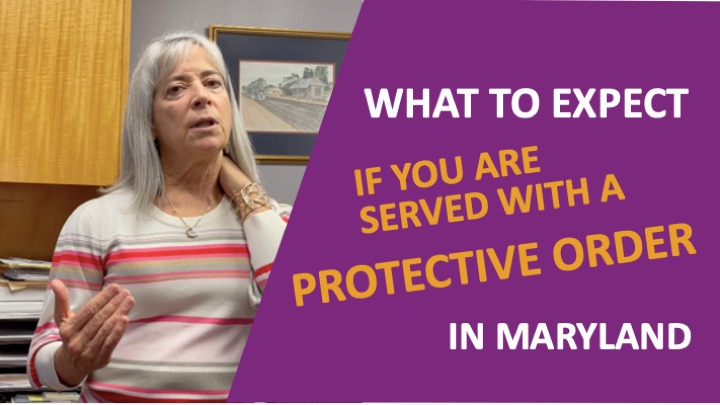If you are a victim of domestic violence – you are not alone. In Maryland, in February 2021 alone, there were a total of 1,711 domestic violence and various types of protective orders hearings in Maryland courts – or an average of more than 61 every day. 46% of those hearings were for “assault,” and 37% for “caused a fear of harm.” And you can be sure that many acts of violence are not reported. Victims are often ashamed, afraid of, or dependent on the abuser. Victims may feel stuck like there is nowhere to go. There is no reason for you to continue to be a victim of domestic violence. With the right resources and support, you can free yourself from violence.
TYPES OF PROTECTIVE ORDERS AND DOMESTIC VIOLENCE IN MARYLAND
A very effective resource to protect you against future violence is an Order of Protection From Domestic violence. These orders, when granted, often remove the abuser from home for a year. A year gives the victim time to heal and get back on his or her feet. Should you decide to pursue an Order of Protection from Domestic violence, you must first determine whether you qualify.
HOW DO I KNOW IF I AM ELIGIBLE TO FILE FOR A PROTECTIVE ORDER?
Generally, all types of protective orders in Maryland apply to people in a domestic relationship. In Maryland, you may be eligible for a protective order if your relationship falls into one of these categories:
- You are married, divorced, or currently separated from the abuser;
- You are related by marriage, blood, or adoption (this includes stepparents and stepchildren if they have lived with you for at least 90 days in the past year);
- You have lived together in a sexual relationship with the abuser for at least 90 days in the past year;
- You have a child with the abuser;
- You had a sexual relationship with the abuser in the past year;
- You are a vulnerable adult;
- You were raped or sexually assaulted by the abuser (including attempts) in the past six months.
WHAT TYPES OF ABUSE ARE COVERED?
In Maryland, grounds for an order of protection from domestic violence can include:
- Assault in any degree. Assault means unwanted touching.
- That the abuser caused fear of harm. The fear, however, must be reasonable fear as an objective person would decide if in a position similar to the victim.
- That the abuser actually caused harm,
- False imprisonment. False imprisonment is restraining someone against their will.
- Mental or physical abuse of a child. While Maryland does allow corporal punishment of a child, the corporal punishment must be reasonable.
- Sexual assault, rape or attempted sexual assault,
- Stalking,
- Revenge porn,
- Statutory abuse of a vulnerable adult.
If you believe that you are a victim of any of these acts of domestic violence, you should consult with an attorney. You can also petition the court for relief on behalf of a child or a vulnerable adult.
WHAT IS THE DIFFERENCE BETWEEN A PROTECTIVE ORDER, A RESTRAINING ORDER, AND A STAY-AWAY ORDER?
In the state of Maryland, it is called a Protective Order, or Order of Protection from Domestic Violence. Other states may call it a restraining order or stay-away order. They all refer to the same thing.
THE PROCESS
In Maryland, there are different stages of the Order of Protection from Domestic Violence process – from the filing the initial petition, to the initial hearing, to the temporary hearing, to the final hearing, the stages can be confusing.
1. Interim Protective Order
Suppose you filed a petition when the court is closed. In that case, you will have an immediate interim hearing with a commissioner that may result in an interim protective order being issued – if your relationship qualifies. The commissioner finds reasonable grounds to believe the abuse occurred. This interim Order of Protection from Domestic Violence may direct the person accused of causing the abuse (called the respondent) to:
- Refrain from further threatening or abusing the petitioner
- Stop from contacting or attempting to contact the petitioner
- Refrain from entering the petitioner’s residence, temporary residence, or place of work
- Should stay away from the family of the person
- If both persons are staying in the same house, then the respondent may be ordered to vacate the house.
- If the abused person is a child, then award temporary custody.
Once an Interim Order is issued, a temporary hearing is conducted with a judge in about two days, where the Judge will determine whether to issue a Temporary Order of Protection from Domestic Violence. The standard to get a Temporary Order of Protection from Domestic Violence issued in your favor is very low. You must report being a victim of an act of domestic abuse.
2. Temporary Protective Order(TPO)
At the second hearing (or first if the court is open when the original petition was filed), a judge will review the details and evidence and grant a temporary protective order (TPO) if the court finds that the act complained of is domestic abuse as defined by the statute. A TPO will last for about seven days until the final hearing.
3. Final Protecive Order
A final protective order is given after the final hearing, where both parties may present evidence. If the petitioner is eligible for the order, then a Protective order may be granted for as long as one year and possibly renewed for another six months, in some instances.
A final protective order includes:
- Injunctive relief for the petitioner by restraining the respondent from entering the premises
- Temporary custody of the minor children is decided, if applicable
- A spouse or children may get temporary financial support from the respondent
- Temporary use and possession of a home and vehicles that are jointly owned
- Ordering the respondent to surrender any firearms in their possession
Failing to comply with the protective orders can lead to criminal prosecution by the court and a fine.
CONCLUSION
If you are a victim of abuse or domestic violence, you may want to consider filing for a Protective Order to defend against the person abusing you. This process is not connected directly to a divorce filing. Either way, before filing a petition, you should discuss your options with an attorney.
Pare & Associates, LLC is an experienced family law practice located in Germantown, Maryland, with the experience, compassion, and knowledge to guide you through the process step-by-step. If you consider filing for a protective order, contact us for a FREE, no-obligation phone or video consultation.





